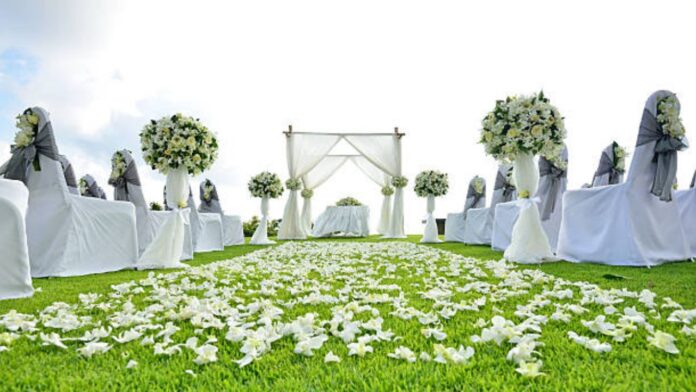Introduction: The Importance of Selecting the Right Venue
Your wedding day is one of the most special and memorable days of your life, and selecting the perfect venue plays a crucial role in creating an unforgettable experience for you and your guests. The venue sets the tone for your wedding, reflecting your style, personality, and vision, while providing a comfortable and enjoyable atmosphere for your celebration. In this comprehensive guide, we’ll walk you through the factors to consider when choosing a wedding venue, explore the various types of venues available, and provide tips for narrowing down your options and making the right decision.
Factors to Consider When Choosing a Wedding Venue
Budget Considerations
Before diving into the search for your dream venue, it’s essential to establish a budget for your wedding, as this will help you narrow down your options and ensure you don’t overspend. Keep in mind that the venue is typically one of the most significant expenses, so allocate a realistic portion of your budget to this aspect of your wedding.
Guest Capacity and Accommodations
When selecting a venue, consider the number of guests you expect to attend your wedding. It’s crucial to choose a location that can comfortably accommodate your guest list, ensuring there’s ample space for dining, dancing, and mingling. Also, consider any specific needs your guests may have, such as handicap accessibility or special dietary requirements.
Location and Accessibility
The location of your wedding venue will impact not only the atmosphere of your event but also the convenience for your guests. Consider factors such as travel time, parking availability, and access to public transportation. If you have guests travelling from out of town, proximity to hotels and airports is essential.
Venue Style and Ambiance
Your wedding venue should reflect your personal style and taste, whether that’s elegant and classic, rustic and outdoorsy, or quirky and unconventional. Consider the overall aesthetic you want for your wedding when searching for venues, and make sure the venue’s style complements your vision.
Types of Wedding Venues: Pros and Cons
Traditional Wedding Venues
Traditional venues, such as banquet halls, hotels, and country clubs, are popular choices for their convenience and all-inclusive packages. These venues often provide in-house catering, furniture, linens, and other amenities, making planning more straightforward. However, they may be less flexible in terms of decor and personalization.
Outdoor Wedding Venues
Outdoor venues, like gardens, vineyards, and beaches, offer stunning natural backdrops for your wedding. They can be more budget-friendly and provide a unique and romantic atmosphere. However, they often require additional planning for weather contingencies, permits, and rentals.
Destination Wedding Venues
Destination weddings held at exotic or far-off locations can create unforgettable experiences for you and your guests. They often have a more intimate feel, but may require more planning and coordination, and can be more expensive for guests to attend.
Unique and Unconventional Wedding Venues
Non-traditional venues, such as museums, art galleries, or historic sites, can provide a memorable and distinctive setting for your wedding. These venues may require more creativity and flexibility in planning, but can create a truly one-of-a-kind celebration.
Tips for Narrowing Down Your Venue Options
Creating a Venue Wishlist
Before you start visiting venues, make a wishlist of your must-haves and deal-breakers. This list will help you stay focused on what’s most important to you and make it easier to eliminate venues that don’t meet your criteria.
Conducting Virtual and In-Person Visits
Once you have a shortlist of potential venues, schedule virtual or in-person visits to get a feel for the space, layout, and ambiance. Pay attention to the staff’s responsiveness and professionalism, as this can give you an idea of the level of service you can expect throughout the planning process.
Reading Reviews and Testimonials
Online reviews and testimonials from other couples can provide valuable insight into the experiences they had at a particular venue. Take note of any recurring themes or issues, as these can help you make a more informed decision.
Questions to Ask Your Wedding Venue Before Booking
Before committing to a venue, make sure to ask the right questions to ensure it meets your needs and expectations. Some essential questions include:
- What dates are available for your desired time frame?
- What is the venue’s capacity and layout for your guest count?
- What is the cancellation or rescheduling policy?
- Are there any restrictions on decor, vendors, or noise levels?
- What are the available catering options and pricing?
- Is there a backup plan in case of inclement weather for outdoor venues?
Contracts and Agreements: What You Need to Know
Once you’ve found the perfect venue, review the contract carefully before signing. Ensure all details, such as date, time, services provided, and payment terms, are clearly outlined. Make note of any penalties or fees for changes or cancellations, and don’t hesitate to ask for clarification on any points you’re unsure about.
Conclusion: Trusting Your Instincts and Embracing the Journey
Choosing the perfect wedding venue may seem overwhelming, but trust your instincts and remember that this is an exciting and joyous process. By considering the factors outlined in this guide, conducting thorough research, and visiting potential venues, you’ll be well on your way to discovering the ideal location for your dream wedding. Embrace the journey, and remember that the most important thing is celebrating your love story with the people who matter most to you.









